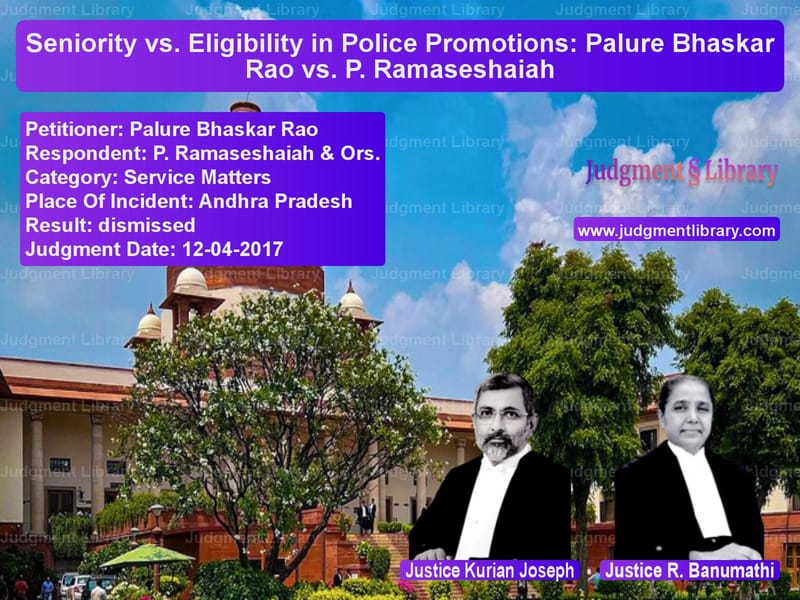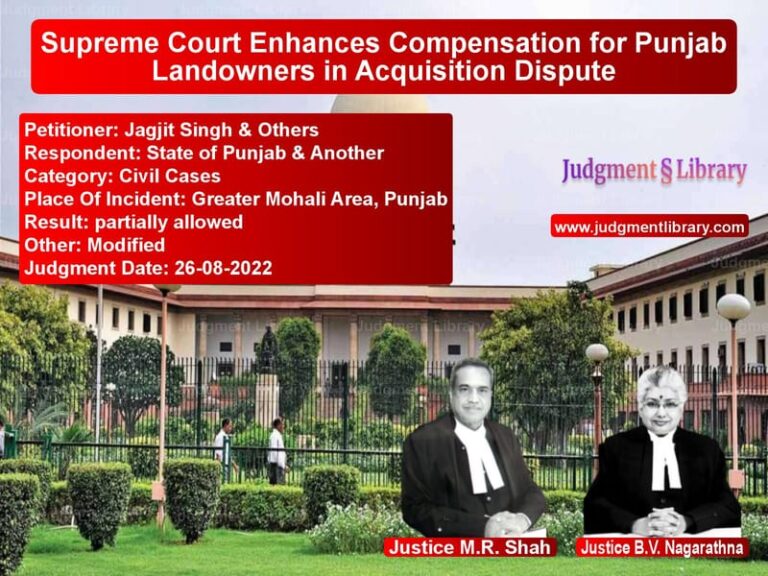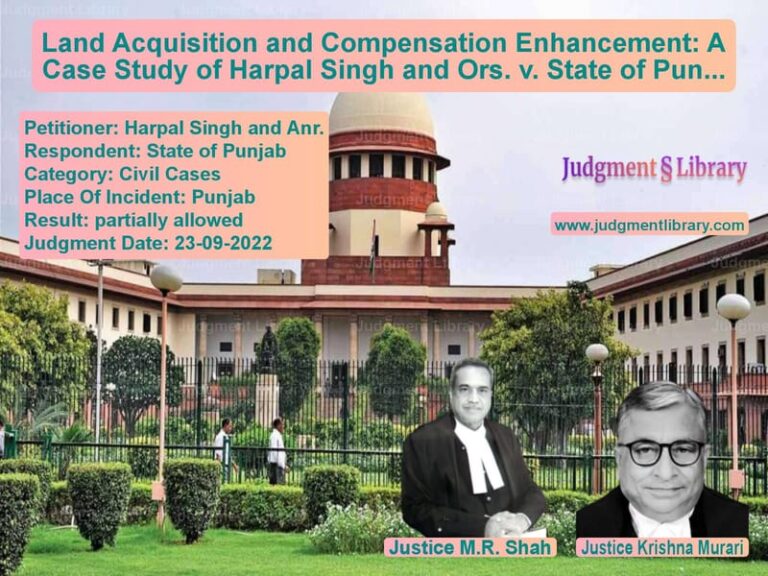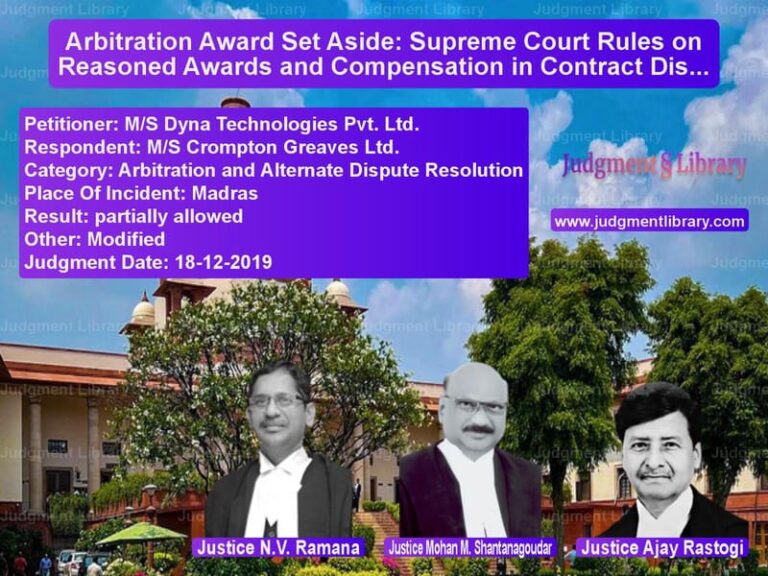Seniority vs. Eligibility in Police Promotions: Palure Bhaskar Rao vs. P. Ramaseshaiah
The case of Palure Bhaskar Rao vs. P. Ramaseshaiah & Ors. revolves around the legal question of whether seniority alone is sufficient for promotion or if eligibility criteria must also be met. The Supreme Court was called upon to decide whether service as a Reserve Sub-Inspector (RSI) could be counted towards the required service period for promotion to the post of Inspector of Police.
This case has significant implications for government service rules and the interpretation of recruitment policies, particularly in distinguishing between simple transfers and recruitment by transfer. It clarifies how service rules should be applied in determining promotions within the police force.
Background of the Case
The dispute arose in the context of the Andhra Pradesh Police Subordinate Service Rules and the Andhra Pradesh Police Service Rules. The appellants, who were originally appointed as RSIs and later transferred to the position of Sub-Inspector (Civil), claimed that their total years of service, including the period served as RSIs, should be counted for promotion to the position of Inspector.
Under the Andhra Pradesh Police Subordinate Service, there are seven categories of officers. These include Sub-Inspectors (Civil) and RSIs, who perform different roles. According to the service rules, RSIs can be transferred to the Sub-Inspector (Civil) post against a reserved 5% quota. The crucial question before the Court was whether an officer’s service as an RSI could count towards the six-year eligibility requirement for promotion to Inspector.
Legal Issues
- Whether seniority as an RSI should be counted for eligibility for promotion to Inspector.
- Interpretation of Rule 5(F)(i) of the Andhra Pradesh Police Service Rules concerning eligibility for promotion.
- The difference between a transfer and recruitment by transfer.
Arguments by the Appellants
The appellants contended that since their seniority as RSIs was retained upon their transfer to Sub-Inspector (Civil), their total service—including their years as RSIs—should be considered when determining eligibility for promotion to Inspector.
They further argued that treating their service differently from direct recruits and promotees was discriminatory under Article 14 of the Constitution, which guarantees equality before the law. The appellants asserted that since their pay scale was the same as that of Sub-Inspectors (Civil), their service as RSIs should be counted toward the six-year eligibility requirement.
Arguments by the Respondents
The State of Andhra Pradesh opposed this view, arguing that RSIs and Sub-Inspectors (Civil) were distinct roles with different functions. They pointed out that eligibility for promotion to Inspector was governed by Rule 5(F)(i), which explicitly required six years of service as a Sub-Inspector (Civil). The respondents asserted that since the appellants had been transferred into the role of Sub-Inspector (Civil), they had to meet the same eligibility criteria as other officers in that category.
Supreme Court’s Judgment
The Supreme Court ruled in favor of the respondents, holding that only service as a Sub-Inspector (Civil) could be counted towards the six-year eligibility requirement for promotion to Inspector.
The Court observed:
“The Andhra Pradesh Police Subordinate Service and the Andhra Pradesh Police Service are two distinct and separate services. Though the pay scales of both categories in Class I post of A.P. Police Subordinate Service are the same, the posts are not interchangeable.”
The Court clarified that seniority alone does not guarantee eligibility for promotion:
“Merely because a person is senior, if the senior is not otherwise eligible for consideration as per the rules for promotion, the senior will have to give way to the eligible juniors.”
The Court also distinguished between transfer and recruitment by transfer, emphasizing that they are distinct processes. While a simple transfer involves moving an employee within the same cadre, recruitment by transfer entails selection from one cadre to another. The Court explained:
“Transfer in relation to service simply means a change of place of employment within an organization. Such transfer does not result in termination of lien in the parent cadre. However, recruitment by transfer is a different service concept altogether. It is a method of recruitment to a different service, resulting in induction into a new cadre.”
Key Legal Takeaways
- Seniority and eligibility for promotion are distinct concepts: Seniority alone does not entitle a candidate to promotion if they do not meet the required eligibility criteria.
- Recruitment by transfer is different from simple transfer: Employees selected for transfer to a new cadre must fulfill the eligibility requirements of that cadre.
- Only service as a Sub-Inspector (Civil) counts toward eligibility: Service as an RSI cannot be included in the six-year eligibility requirement for promotion to Inspector.
- Equal pay does not mean equal eligibility: Even if RSIs and Sub-Inspectors (Civil) have the same pay scale, they belong to different cadres with different promotion criteria.
- Rule 5(F)(i) of the A.P. Police Service Rules is binding: The Supreme Court upheld the rule requiring six years of service as a Sub-Inspector (Civil) for eligibility to become an Inspector.
Implications of the Judgment
This ruling has far-reaching consequences for service law in India, particularly in government and police departments. It underscores that service rules must be followed strictly and that employees must fulfill all eligibility requirements before being considered for promotion.
The judgment also affirms that recruitment by transfer is a distinct method of selection and should not be confused with regular transfers within the same cadre. The decision ensures that merit-based criteria remain the cornerstone of promotions in public service.
Conclusion
The Supreme Court’s ruling in this case reinforces the importance of adhering to service rules and eligibility criteria in promotions. While seniority is an important factor, it cannot override explicit service requirements. The decision clarifies the distinction between simple transfers and recruitment by transfer, setting a precedent for future disputes in public sector employment.
For government employees, this case highlights the necessity of understanding their respective service rules and ensuring compliance with eligibility criteria for promotions. The ruling provides clear guidance on the principles governing promotions and recruitment by transfer in police services across India.
Don’t miss out on the full details! Download the complete judgment in PDF format below and gain valuable insights instantly!
Download Judgment: Palure Bhaskar Rao vs P. Ramaseshaiah & Or Supreme Court of India Judgment Dated 12-04-2017.pdf
Direct Downlaod Judgment: Direct downlaod this Judgment
See all petitions in Promotion Cases
See all petitions in Public Sector Employees
See all petitions in Recruitment Policies
See all petitions in Judgment by Kurian Joseph
See all petitions in Judgment by R. Banumathi
See all petitions in dismissed
See all petitions in supreme court of India judgments April 2017
See all petitions in 2017 judgments
See all posts in Service Matters Category
See all allowed petitions in Service Matters Category
See all Dismissed petitions in Service Matters Category
See all partially allowed petitions in Service Matters Category







